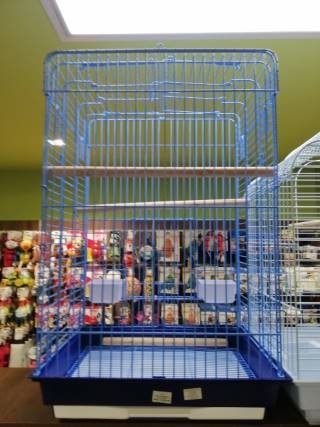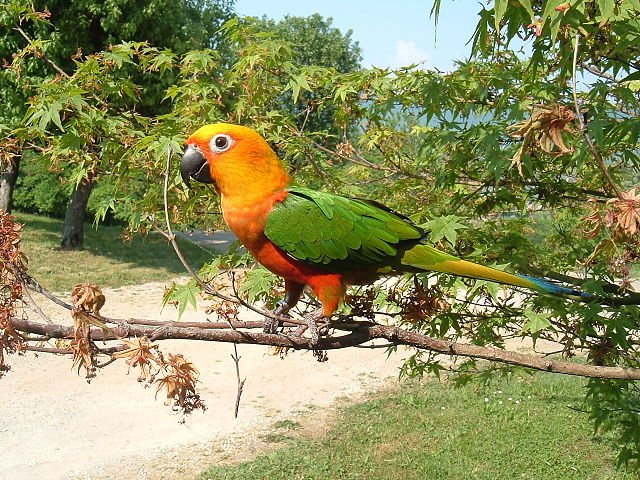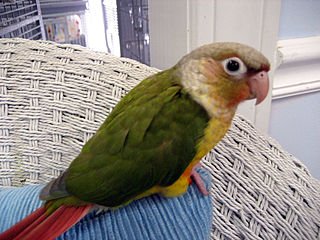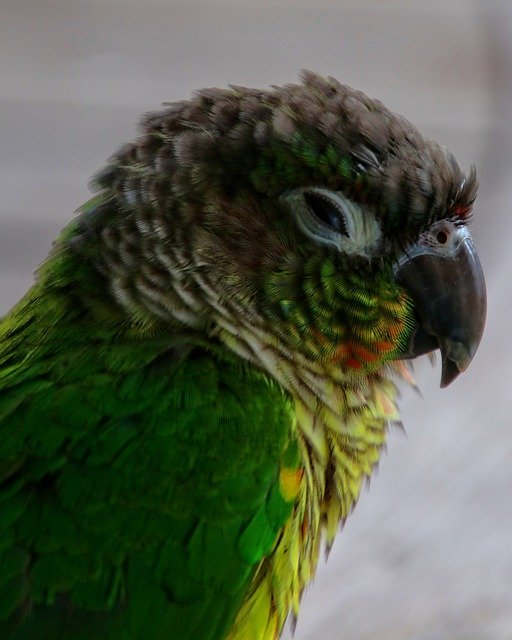One of the most colorful parrots, Jenday Conures are very social and energetic. They can rightly be said as one of the silliest clowns among the parrot species courtesy their goofiness. Jenday conures are native to northeastern Brazil where they reside in lowland deciduous woodlands, dense growth, and palm groves. These medium-sized Conures prefer to build their nest high up in the tree hollows.
They are a popular choice among bird lovers as they are excellent companions. Their long lifespan and playful nature also make them the right choice as a pet. Jenday conures are loved all around the globe due to their cuddles and tricks.
Jenday Conure Lifespan
Jenday Conures are indeed a lifelong companion. Their natural lifespan is 25-30 years. However, accidents and illnesses might have an impact on their lives. They live up to 20 years in the wild. A healthy lifestyle with a well-balanced diet can greatly increase the life expectancy of a Jenday.
Since Jendays are highly sensitive to diseases, they need regular medical checkups for leading a healthy life. They need extra care and attention from their owners.
To extend the lifespan of Jenday Conure, they must be offered sufficient time for carrying out physical activities. Regular exercise and playing shall form a part of their daily schedule. In short, an amicable environment, healthy diet, clean surroundings, and regular checkups are the major considerations for increasing Jenday’s lifespan.
Jenday Conure Size
Jenday Conures are considered as small birds but not the smallest. They are larger than Green Cheek Conures. Their average size is 12 inches when measured from their beak to tail tip. They are sometimes also referred to as medium-sized conures as their long tail gives an illusion of a larger size.
Jenday Conure Price
The price of a Jenday Conure starts from $400 and can reach up to $600. Further investment in a cage and its accessories can be expected initially. The recurring costs of keeping Jenday as a pet include expenses on his diet, toys, replacement of cage accessories, and medical costs.
Jenday Conure Breeding
It is difficult to determine the gender of Jenday Conures. A DNA test or surgical sexing is, therefore, required before breeding. Though male and female Jenday Conures have a little difference in their iris and eye rings, still accurate gender determination cannot be done just by looking at them.
A Jenday acquires sexual maturity at the age of 4-5 months. They can be bred throughout the year without any binding to a specific season. Yet, Jenday Conures shall be bred in temperatures above 90°F. This is because the baby Jendays find it hard to survive in extreme heat.
The fertility of Jenday Conures is relatively higher than many other parrot breeds. They lay 2 to 4 eggs and the incubation period is 25-27 days. After around 7 weeks, the baby chicks are ready to fledge.
Jenday Conure breeding behavior
The couple seems to be grooming and feeding each other before breeding. The mating time of a female and male Jenday is only three minutes. This short period makes them very affectionate towards one another. The female Jenday’s abdomen swells before laying eggs.
Jenday Conure breeding problems
In some cases, they may eat and destroy the eggs. It happens when they have a deficiency of calcium in their diet. It’s vital to take care of their diet during the breeding period.
Jenday Conure Colors
Jenday Conures are loved for their colorful charismatic appearance. Their multi-colored plumage gives them a unique mesmerizing look. Jenday Conures are monomorphic parrots. This means both the genders of this species appear the same. They are full of a variety of vibrant colors including red-orange, green, and yellow.
Starting with the head, they have a yellow-crowned head for which they are also famed as Yellow-Headed Conure. This bright yellow color starts from the head and runs through their neck to their chest. The bird’s beak is pure black. They have a red-orange body with green wings and back. Their cheeks are colored with orange spots. The wing coverts are green and tips are iridescent blue. Their tail also carries some blue feathers.
The belly of a Jenday Conure looks reddish-orange. Their legs and feet are gray. They have dark eyes. Though Jendays are monomorphic yet there is a slight difference between the two gender’s eyes. The male Jenday Conures have dark brown irises as compared to light brown irises in females.
Also, the males present a white eye-ring whereas females have grayish eye-ring. However, Jenday’s sex determination cannot be based on this distinction since it is not a foolproof method. DNA or Surgical Sexing is recommended for determining Jenday Conure’s gender.
Jenday Conure vs Sun Conure
People often confuse between a Jenday and a Sun Conure because of the similarities in their colors. Their size and shape are the same and a Sun Conure also possesses green and yellow colors. An adult Sun Conure also has a bright yellow and orange head similar to a Jenday Conure. However, the plumage of these two species can help in differentiating between them. The wing-coverts of a Sun Conure feature some yellow color as against no signs of yellow in the case of Jenday. The majority of primary coverts of a Sun Conure carries dark blue that adds up to the existing confusion between the two species. Also, the tail of a Sun Conure is olive-green with the tip being blue whereas the tail of a Jenday is covered with blue feathers all over. In the adult Sun Conures, the mantle and vent are yellow-colored as against green in the case of a Jenday.
When these parrots are young, it is extremely difficult to distinguish between them as green color dominates in both the species. With the passing years, the green begins to get brighter in Jendays whereas yellow and orange starts appearing on the bodies of Sun Conures.
Therefore, one must wait for the bird to turn into an adult for correct species determination. It requires an expert eye to know the difference even in the two adult birds. The major distinguishing feature is the color of their wings with Jenday Conure carrying primarily green wings and Sun Conure showcasing the yellow ones.
Jenday Conure Food
In their native habitat, Jenday Conures feed on fruits, seeds, and nuts found in the woodlands of northeastern Brazil.
In captivity, Jendays require a well-balanced diet for a healthy lifestyle. Their nutritional requirements can be met better if their regular pelleted diet is supplemented with fresh fruits, veggies, nuts, and seeds. This will mimic their diet in the wild that carries a wide variety of nutrients.
Along with the correct selection of food items, it is also important to offer the right quantity of each item to a pet Jenday. Fresh fruits and vegetables can be offered around ⅛ to ¼ cup in the morning and at night. Pellets can form a part of their daily diet since Jendays are extremely active. However, nuts and seeds shouldn’t be added to their scheduled diet. These items shall be offered only as occasional treats.
Jenday Conure Exercise
Jenday Conures are very active and energetic. They need adequate space in their cage for carrying out their goofiness. They also require adequate time outside the cage daily. A Jenday Conure loves to fly, play, and explore varied things.
Jenday Conures quickly learns to hang out on a play stand adorned with toys and ropes. They also enjoy using other interesting bird-safe trinkets.
While keeping them out of the cage, it must be ensured that the area is free of hazards. It is also recommended to keep dogs, cats, and other pets in a separate room. Additionally, harmful objects include ceiling fans, open windows, and doors. It’s important to address these hazards before opening the pet Jenday’s cage so he doesn’t meet with an accident.
A lot of fun activities should be set up inside the cage of a pet Jenday. A swing is always a must as they will quickly make it their home roost. Ladders, ropes, and bells shall also form part of their cage to provide them a jungle-gym experience.
Jenday Conure Cage
A rightly sized cage plays a significant role in keeping a Jenday Conure healthy. Since the species is not considered large, a Cockatiel cage might look appropriate to a Jenday owner for his bird. But the reality begs to differ. Jenday Conure needs much more space than the other birds of his size.
They like to fly both inside and outside the cage. Therefore, the cage should be large enough for them to flap their wings and move around freely. Jenday Conures are incredibly active. They are known to get cranky in smaller spaces.

The preferable dimensions for his cage are 36 by 24 by 24 i.e. 36 inches long, 24 inches high, and 24 inches wide. A bar spacing of half an inch is appropriate. The cage size should be double for keeping a pair. Maintaining an adequate cage temperature is essential for keeping a pet Jenday healthy. The recommended temperature is between 60 degrees and 75 degrees Fahrenheit.
The foremost reason for choosing a spacious cage for Jenday Conure is his active lifestyle. A large cage space will allow him to carry out the physical activities that translate to a regular exercise for him. Providing some cage accessories like swing, chewable wooden toys, and acrylic toys are also vital for their physical and mental health.
Jenday Conure Talking Ability
Jenday Conures are intelligent along with being social. Yet, they are not among the most interactive parrots. They develop a limited vocabulary. Though Jendays do not speak much yet they are entertaining. They can learn everyday words and phrases. And if taught well, they can learn more words than their natural capabilities and become a better talker than many other Conures.
Jenday conures are not famed for their great talking abilities. However, they mimic human speeches and general household noises such as microwaves or telephone sound. They have shrill calls in the form of chirps and beeps. They produce these sounds for showing different emotions when they are happy, sad, excited, or simply a bit spoiled.
Are Jenday Conures loud?
Jenday conures are the noisemakers of the house. They make very loud calls. Shrill and raucous noises can cause discomfort to the owners but these sounds can be controlled by imparting good training. Jenday Conures are charming companions without a doubt but not for the ones who do not like noisy pets.
The loud personality of these pet birds makes them unfit for apartments. Neighbors can be pissed off with their loud voices. Many of the Jenday Conures become screamers when they feel neglected. It is, therefore, in the owners’ hands to control the noise produced by their pet Jenday.
Jenday Conure Health
It is important to maintain a healthy lifestyle for Jenday Conures. The most important consideration is to take care of their diet. A nutrient-rich diet leads to a healthy Jenday. Other important aspects include his daily exercise regime, maintenance of proper hygiene, and assurance of regular social interaction. If the owner pays attention to these important aspects, the pet Jenday won’t experience any major health issues.
Jenday Conure is a hardy parrot. He can quickly adapt to an ‘out of the wild’ life. A good thing is, Jenday Conures are very active and energetic be it in the wild or at home. So, obesity isn’t a major issue for them, unlike other pet parrots. Yet, these birds are susceptible to several other diseases.
These problems may include:
- Psittacine beak and feather disease: This is a fatal viral infection disorder. It affects a Jenday’s immune system, beak, and feathers.
- Beak Malocclusion: This disease relates to the wrong alignment of Jenday’s beak including overgrown beak problems.
- Proventricular dilatation disease: This is another viral condition. It affects the digestive system of a Jenday Conure.
- Psittacosis: It is a bacterial respiratory illness.
- Aspergillosis: This is a fungal infection that impacts the respiratory system.
Apart from these major health issues, Jenday Conures may also face some minor problems like wheezing or coughing.
It is important to take veterinarian assistance immediately on the occurrence of any common symptoms in pet Jenday. Such symptoms might take the form of:
- Apathy
- Loss of Appetite
- Difficulty in Breathing
- Losing feathers or fluffed feathers
- Discolored or runny stools
- Red or swollen eyes
Cleaning a pet Jenday’s food and water bowls regularly also help to prevent the occurrence of many diseases. Using a different bowl for each pet is also recommended.
Jenday Conure Training
Jenday Conures are extremely fond of human interactions. For this reason, it’s never hard to train him. They are social and energetic and are willing to learn something new all the time. The best part about them is their love for cuddles. It makes the development of the bond much easier for the Jenday owner which is the first step towards pet training.
Once a bond is created, the owner can start teaching the step-up technique for easier handling of the bird. Repetition is the key to quickly tame and train a Jenday Conure. The same goes well for teaching words and phrases to him. A little patience is always required while training a pet bird.
Since Jendays are good at mimicking general human speeches, the owner must take out time to interact with his pet daily. This will act as a revision for the bird and he will pick up the words better.
The Jenday training can be a mix of both step-up technique and interaction as it will stimulate the bird both mentally and physically at the same time. It will solve the dual purpose of training the pet and keeping him healthy.
Since Jendays have a loud personality, it is also important to take care of this aspect during their training period. When the owner sets the noise level in the initial days of his interaction with the pet Jenday, the bird is bound to follow the rules. The best way to discourage loud behavior is to stop responding to the pet bird when he screams. This way, he knows that his shrills will not be answered at all.
Jenday Conure Intelligence
Jenday Conures are considered as intelligent as they can very well mimic the sounds from their surroundings. They are not the best talkers in the parrot world but learn quite a few words if the owner repeats them daily. Also, they are always curious to explore their surroundings and learn about various things.
The Bottom Line
Jenday Conures are big personalities packed in small bodies. They are playful, happy-go-lucky conures for the owners. Their social nature and love of human interaction make them a great option as a pet. They are cuddly and affectionate with their owners. It is also possible that they will get too attached to a particular person. Jenday Conures are, therefore, an excellent family pet and a lifelong companion.




